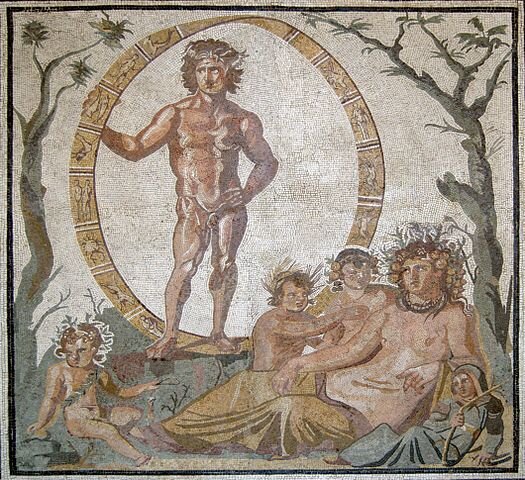This Roman festival was also called Feriae and the exact dates were made by the local priests or magistrates. During this time, we honor Tellus (Mother Earth) and the Goddess of Agriculture Ceres. Sementivae is a grain-oriented festival that celebrates the preparation of the fields for sowing.
Ceres is the Goddess that governed planting and the origin of crops. Tellus as the earth gave the plants a place to live. Prayers and sacrifices (usually a pregnant sow) were made to the Goddesses to ask for protection of the crops and a bountiful season.
This holiday was instituted for the sake of the Gods and involved religious rites. The first day was also a day of rest from work for all. Slaves were to be given a festive meal and the day off.
Typically, the ceremony starts around January 24 with a festival to honor Tellus. It ends around February 2 with a festival honoring Ceres. Keep reading to learn more and some ways you can celebrate.
Tellus
The Goddess of the earth, also known as Terra Mater, ruled over agriculture and earthquakes. In addition, she ruled over marriage and fertility. She was worshipped in Ancient Rome from approximately 753 BCE – 476 CE / AD. Her counterpart in Ancient Greece is Gaia.
She was considered one of the twenty principal gods and was often associated with Ceres. Tellus or Terra is associated with flowers, fruits, vegetables, and cattle. One of her sons is Saturn.
In ancient art, she is shown reclining on the earth or rising from within the ground. The words Tellus and Terra both mean “earth” and Mater means “mother” in Latin. Earth is one of the four elements.
To honor Tellus bring some earth inside and place it in a dish at your alter.
From a mosiac in a Roman villa ca. 200–250 C.E. Aion, the god of eternity, is standing inside a celestial sphere decorated with zodiac signs, in between a green tree and a bare tree (summer and winter, respectively). Sitting in front of him is the mother-earth goddess, Tellus (the Roman counterpart of Gaia) with her four children, who possibly represent the four seasons.
Ceres
Ceres is the Ancient Roman goddess of agriculture specifically grain crops and also represented fertility and motherhood. She is symbolized by the sickle, wheat, and the cornucopia. Her parents were Saturn and Ops so she was the granddaughter of Terra Mater.
Demeter is her corresponding Greek goddess and Amaterasu her Japanese equivalent.
Her name stems from keres which means with grain. Ceres brought wheat to the Romans and taught them how to plow, sow, and grow the crop. She is felt to have saved the people from a great famine.
Her sacrificial animal is the pig because the Ancient Romans felt they destroyed crops. However, overall, she was felt to be a kind and benevolent deity. She was involved in the day-to-day work of the common folk who were predominantly farmers. We also celebrate her during Cerealia (April 12-19).
““Lady Ceres, bless our seed, may we never want or need. Wave your hand across our fields, nurture our abundant yields.””
Today Ceres appears on the state seal of New Jersey. She symbolizes prosperity. If you are able donate to food banks or help those in need, honoring her role as provider for the plebeians.
Honor Ceres with offerings of grains, bread, milk, honey, or by growing plants. She especially likes mint, poppies, and sunflowers.
Ceres
When honoring her focus on gratitude for abundance, connection to the earth, and supporting your family
Celebrating Sementivae
Oscilla
Small clay discs called oscilla were made with decorations. These were hung on the trees to ward off evil spirits. Young children can easily make these out of homemade playdoh, or you can purchase modeling clay.
Homemade Playdoh
This is an easy peasy recipe that’s fun for your child to make.
Mix the following ingredients well
2 cups flour
¾ cup of salt
4 teaspoons of cream of tartar
2 cups warm water
2 tablespoons vegetable oil
Food coloring (optional)
Plastic bag or container to store it in
Steps:
Simply roll out the dough and cut in a circle. Use a pencil to add a hole so you can hang them.
Decorate them with planting symbols by using a plastic knife or pencil to draw on designs. Let them dry thoroughly.
If you hang them outside you may want to cover them with an artist’s sealer.
Sprouts
This time of year is still too cold in most of the USA to plant outside. However, growing sprouts is a fun indoor gardening activity.
For this activity, you will need to purchase some organic or untreated sprouting seeds. A wide variety of seeds are available from alfalfa to broccoli to spicy radish.
You will also need a quart canning jar, a square of cheesecloth, and a rubber band.
Different seeds have various seed-to-water ratios. However, a good ratio is always three parts water to one part seed.
Place the seeds in the jar.
Add warm water and stir.
Let them sit for 24 hours.
Drain the water, rinse the sprouts off with clean water.
Cover the jar with the cheesecloth and tie it with a rubber band.
Turn the jar over so that it can continue to drain but still get airflow.
Do this twice a day.
You will have sprouts ready to eat in 4 – 6 days.
Baking Bread
Honor Ceres by baking bread. During the festival of Sementivae, the people would bake small loaves of wheat bread to honor her.
Author, Erik studied Anthropology in college and is currently completing an internship with the Smithsonian Museum of Natural History. Erik desires to be a Viking when he grows up and has worked in Outdoor Adventure leading hikes and rafting trips. A solitary Wiccan, Erik writes about Wicca, Norse religion, and making alters.








Morana (Mara, Marzanna, Mora, Mare) is one of the Major Rodnovery deities. The Slavic Goddess of winter and darkness is associated with seasonal rites based on the idea of death and the rebirth of nature.
As the Goddess associated with winter’s death, rebirth, and dreams her death marks the end of Winter and the birth of Lada and Vesna, the deities of Spring.